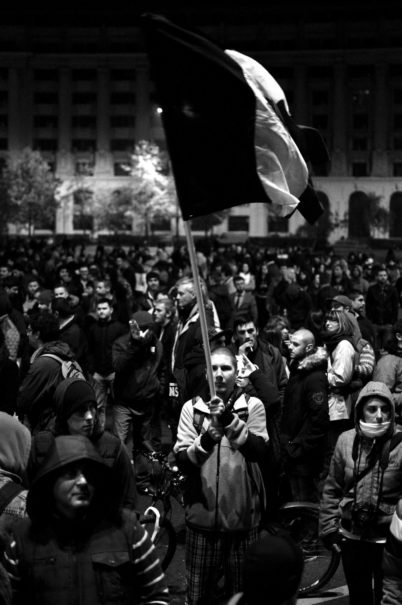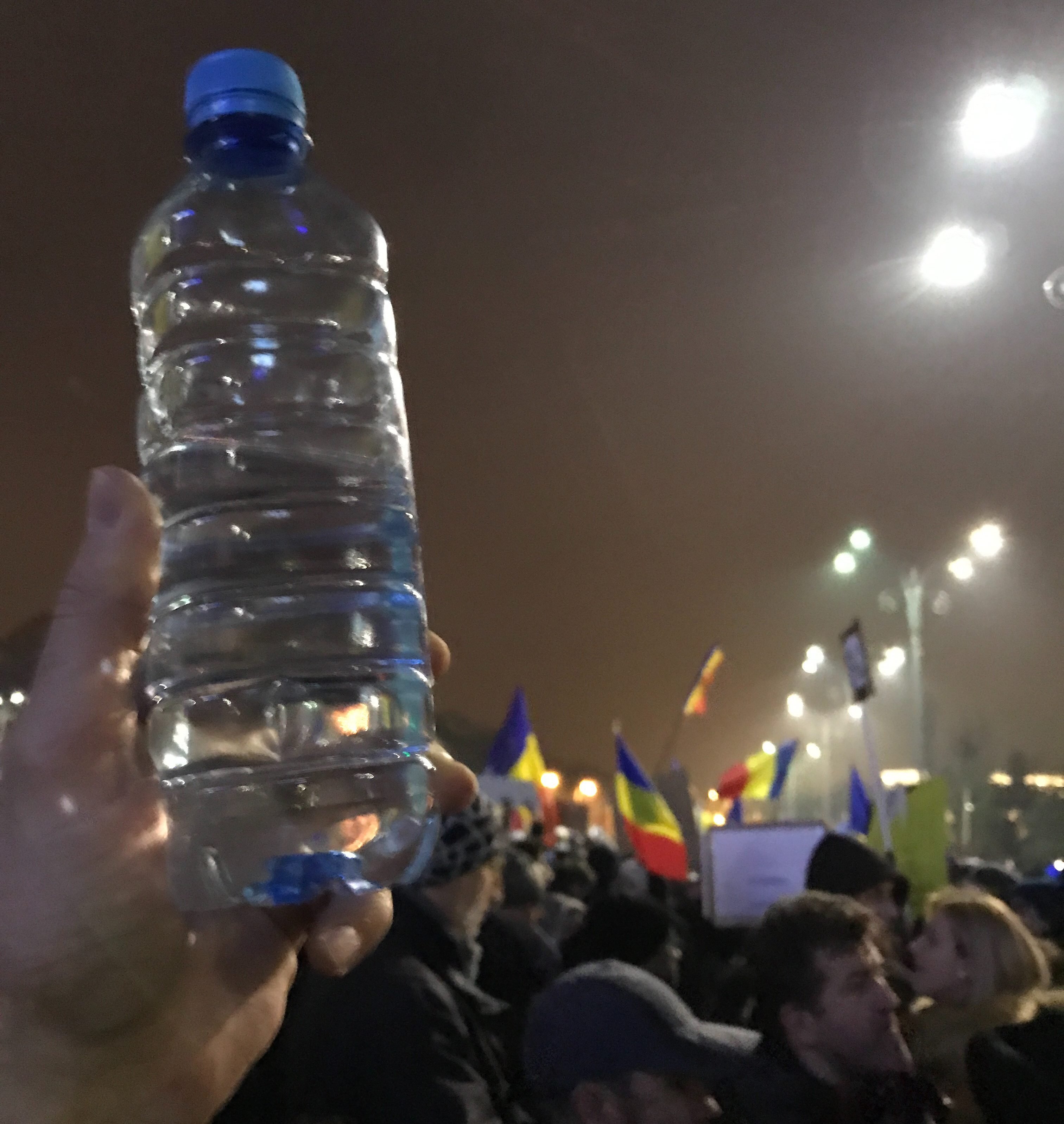
A Fortifying Drink While Resisting Thieves and Scoundrels

A Fortifying Drink While Resisting Thieves and Scoundrels

Palincă in Bucharest
During these past weeks, as many in the U.S. pondered the meaning of resistance, they may have missed the news of relatively effective resistance happening in Romania. The country has been experiencing nightly protests in the thousands since Jan. 18, peaking on Feb. 5 at over half a million.
That night, I was in Bucharest’s Piața Victoriei—Victory Square, where the government sits—and pretty much every Romanian I know was also in attendance. The square was completely full; roads were blocked and people were streaming in from every direction.
We were sharing a plastic water bottle filled with homemade palincă from a northern province, Maramureș, shipped into Bucharest to keep us warm. We took turns drinking the clear, sweet spirit, which is distilled from a fruit mash according to traditions dating from the 14th century. It fortified us while we braved the sub-zero temperatures in the square.
We were protesting corruption and wondering how it was possible that after all the progress Romania has made—putting corrupt politicians behind bars, enforcing laws–suddenly, the political situation seemed to be regressing.
After the country’s most recent elections, a new government was sworn in on Jan. 4. It marked a particularly strong showing for the Partidul Social Democrat (PSD): a nominally center-left party that many see as primarily standing for corruption and the enrichment of associated cronies. Politics in Romania have been complicated of late, with coalitions changing and cabinets resigning frequently. But this was the strongest showing for PSD in a very long time.
While Western media celebrated this as a victory for a traditional European center-left party in the face of a far-right populist onslaught, many Romanians knew better. The PSD came to power on the back of an older form of populism: tax cuts for pensioners, a higher minimum wage, and free public transport. But its appetite for corruption did not appear to have diminished during its period in the political wilderness. In fact, it seemed enraged by the striking success of the National Anti-Corruption Directorate—the body charged with rooting out and prosecuting corruption—which has a 90 percent conviction rate and has convicted hundreds of high-level politicians and members of the judiciary, many of whom were PSD cronies.
In a move Trump would be proud of, the government made known its plans to push policies weakening the penalties to corruption through as emergency decrees, rather than going through Parliament. This intensified protests that were already simmering after drafts of the law were published the week before. Jan. 29 marked the largest protest since Romania’s anti-Communist revolution in 1989: 90,000 took to the cities around the country, including 50,000 in Bucharest. This record would soon be broken repeatedly.
The government looked like it would back down at first, but then passed the decrees anyway the night of Jan. 31. Prisoners indicted under anti-corruption statutes would have their sentences halved, some would be freed immediately, and corrupt acts of up to 200,000 lei (US$47,600) would be decriminalized. Outraged at this brazen legalization of theft, 300,000 Romanians took to the streets on Feb. 1.
On Feb. 5, the government announced it would rescind the emergency decrees. But by that point, Romanians weren’t in a trusting mood: 300,000 protested in Bucharest alone. In the square, we were surrounded by cries of “Hoți! Hoți! Hoți!” (Thieves!) and “Demisia!” (Resign!). The Romanian flag was everywhere, either in its current form or the revolutionary flag with a hole in the middle. At one point, cardboard cut-outs of key members of government were wheeled out wearing striped prison garb.

Each swig of the palincă seemed to focus my mind on the meaning of these protests. Romania has seen tremendous gains since accession to the E.U. in 2007. It has enjoyed some of the best rates of economic growth in Europe, a substantial improvement in quality of life, and a litany of small victories against its endemic corruption. Nearly every Romanian I spoke to in the square said they just wanted to live in a normal country, be part of the European community, and be led by people who were not thieves.
Romanians truly were bucking the far-right fascist trend. But their government was still letting them down. At the protests, you could see the children of ‘89 proudly waving banners again, grizzled pensioners, students, and young professionals. There were families with children; some had even brought pets. It was a resolute atmosphere of non-violence, and many said these protests had succeeded in uniting the country.
In the aftermath of these protests, the government has promised to rescind the decrees but will still try to pass them through a Parliament dominated by their own party. And of course, the PSD refuses to resign. Romanians continue to hit the streets on a nightly basis, cautiously hoping for better. As temperatures look to dive deep into negative Celsius territory, one thing’s for sure: more palincă will be necessary.